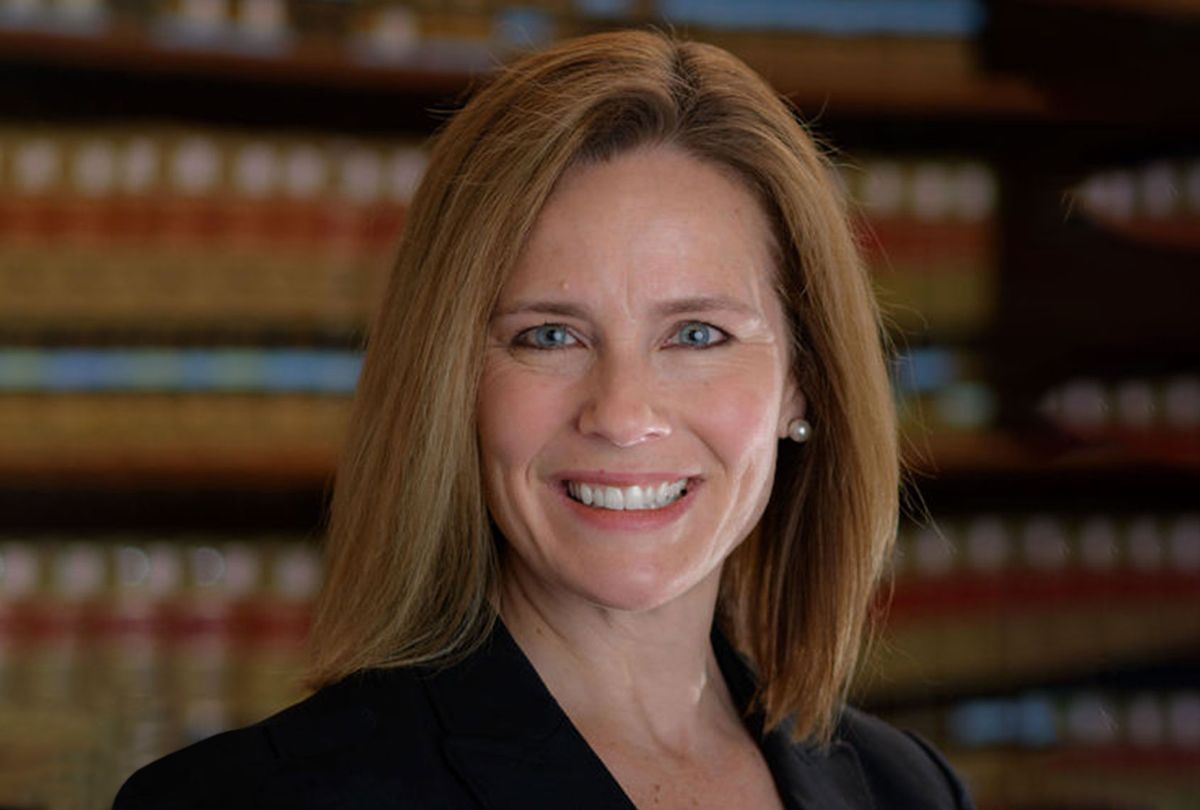President Donald Trump will nominate Amy Coney Barrett to succeed the late Justice Ruth Bader Ginsburg on the Supreme Court, according to a new report.
The White House has indicated that "Barrett is the intended nominee" in "conversations with some senior Republican allies" on Capitol Hill, CNN reported.
While there is always a chance that Trump may change his mind, multiple senior Republican sources told CNN that the president planned to choose Barrett. Trump is slated to unveil his pick on Saturday.
Barrett, who quickly emerged this week as the rumored top candidate, is the only potential nominee known to have met Trump in person, according to CNN.
Trump met with Barrett when she made his short list the last time there was a vacancy on the high court, which ultimately was filled by Justice Brett Kavanaugh. The president has reportedly said privately of Barrett that he was "saving her for Ginsburg."
"She was the plan all along. She's the most distinguished and qualified by traditional measures," a former senior administration official familiar with the process told CNN. "She has the strongest support among the legal conservatives who have dedicated their lives to the court. She will contribute most to the court's jurisprudence in the years and decades to come."
Barrett, 48, has served on the 7th Circuit Court of Appeals in Chicago since she was appointed by Trump in 2017. She is a former clerk to conservative late Justice Antonin Scalia and a longtime law professor at Notre Dame.
Barrett is a favorite of conservatives. Politico noted that her ascension to the Supreme Court would be a "a coup for Catholic culture warriors 25 years in the making and a high point in the right's decades-long project of reshaping the judiciary."
Democrats have raised concerns over Barrett's past criticism of Supreme Court precedents, including Roe v. Wade and the Affordable Care Act. The Supreme Court is scheduled to hear a case one week after the election which could decide the fate of Obamacare.
Barrett argued in 2017 that "Chief Justice Roberts pushed the Affordable Care Act beyond its plausible meaning to save the statute" when the court upheld the law in 2012.
Barrett has also criticized the Roe v. Wade decision, though she acknowledged that the Supreme Court would "probably" let the precedent stand. She later said in 2016 that the court was likely to chip away at some abortion protections which had previously been upheld.
"I think the question of whether people can get very late-term abortions — you know, how many restrictions can be put on clinics — I think that would change," she said.
Sen. Dianne Feinstein, D-Calif., raised concerns about whether Barrett could separate her legal opinions from her Catholic beliefs during her 2017 confirmation hearing.
"You have a long history of believing that your religious beliefs should prevail," Feinstein told Barrett. "The dogma lives loudly within you."
"It's never appropriate for a judge to impose that judge's personal convictions — whether they arise from faith or anywhere else — on the law," Barrett replied.
Despite Barrett's claim to the senator, she previously told students at Notre Dame that a "legal career is but a means to an end . . . and that end is building the Kingdom of God."
Democrats have raised concerns about some of Barrett's other affiliations. She is a former member of the Federalist Society, the shadowy conservative group driving Trump's judicial nominations. She and her husband, who are parents to seven children, are also members of an obscure "charismatic Christian" group called People of Praise.
"Members of the group swear a lifelong oath of loyalty, called a covenant, to one another, and are assigned and are accountable to a personal adviser, called a 'head' for men and a 'handmaid' for women," The New York Times reported. "The group teaches that husbands are the heads of their wives and should take authority over the family."
Trump, who had vowed to choose a woman after nominating two white men, was reportedly also considering federal appellate judge Barbara Lagoa, whom he had appointed to the 11th Circuit Court of Appeals less than one year ago. Lagoa is one of two Trump appointees on a three-judge panel currently deciding whether to dismiss the effort by the president's top campaign strategist Jason Miller to revive his $100 million defamation suit against Gizmodo. She recently ruled in support of a controversial Florida law banning felons from voting until they paid all fines, fees and restitution.



Shares